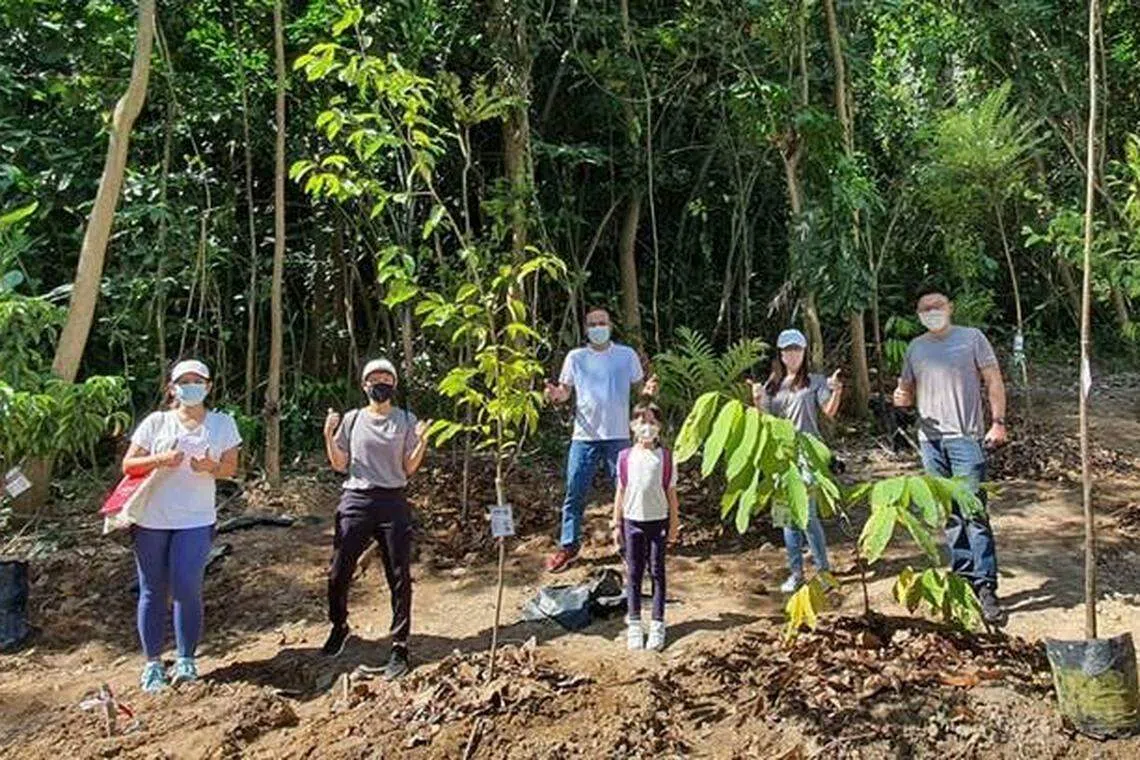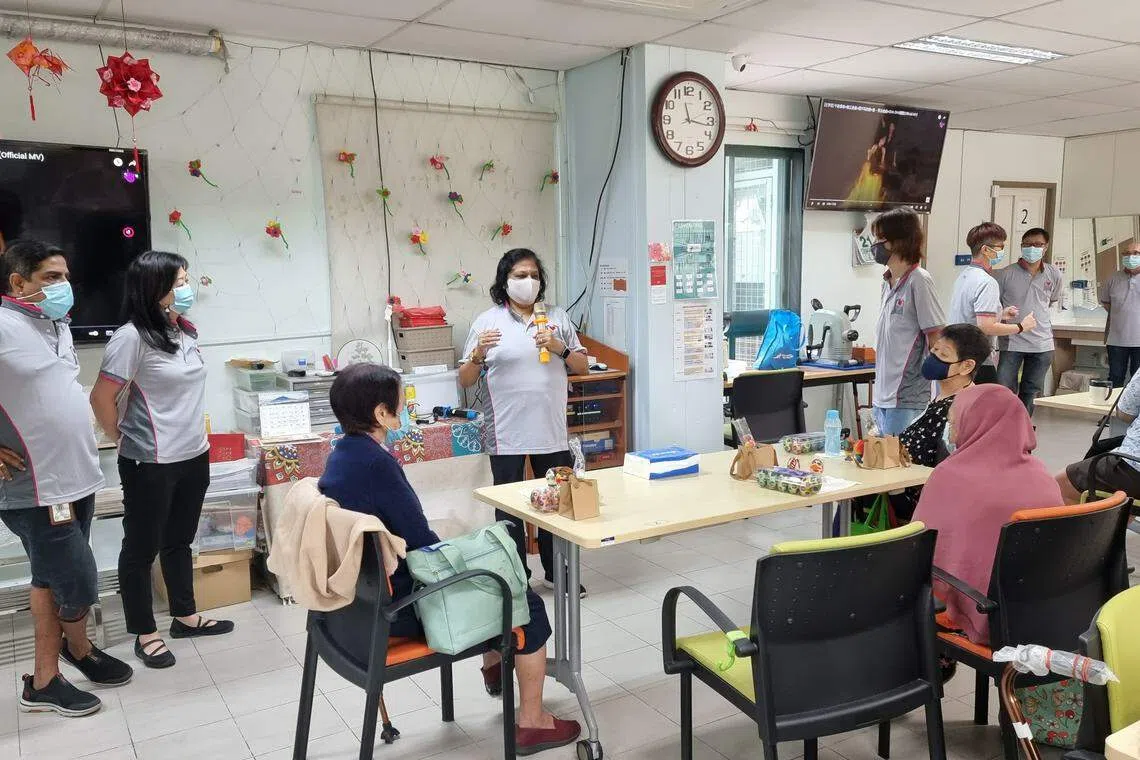More can be done in companies’ journey to give back to society

INVESTORS and consumers typically say that they are increasingly expecting businesses to go beyond a narrow focus on profitability to also being a force for good in society.
As Singapore emerges from the shadows of Covid-19 and takes stock of its impact on companies doing good and wanting to do good, a recent study has found that only 14 per cent of respondents said they agreed or strongly agreed that their businesses had contributed to the well-being of society.
It is clear, then, that there is a gap between what is said and what is being done, going by the Corporate Giving Study done by the National Volunteer & Philanthropy Centre (NVPC) last year. All in, 1,014 people representing a cross-section of local and foreign-owned companies, small and big, in Singapore were interviewed; these respondents were picked for their access to information on their companies’ donations, fund-raising and sponsorship spending.
Tony Soh, the NVPC’s deputy chief executive, said: “These findings reveal a gap – and strategic opportunity – for businesses to not only play a more active role as a force for good in society, but to build resilience to better withstand future crises as well. When companies align their corporate purpose to address the needs of stakeholders, they can create greater value for both business and society.”
Associate Professor Eugene Tan from the Yong Pung How School of Law at the Singapore Management University, referring to the findings, called for an urgent mindset shift among organisations.
Increasingly, companies undertaking activities – in the course of doing business – that contribute to society are not actions that are “nice-to-have”, but necessary for these organisations’ well-being. Companies need to recognise that societal expectations are shifting quite rapidly in tandem with growing concerns about climate change, sustainability, fair trade, social justice, fair-employment practices, he added.
A NEWSLETTER FOR YOU

Lifestyle
Our picks of the latest dining, travel and leisure options to treat yourself.
NVPC’s Soh said: “We have seen that many companies want to do good, but some might not know where to begin, or how to create the impact they desire with the resources they have. NVPC and Company of Good are committed to helping businesses bridge their corporate-giving strategies with a greater purpose and, in doing so, find their North Star. When people, organisations and leaders come together for the greater good, we can make this ‘new normal’ one that embraces and uplifts all stakeholders in society as we become the City of Good.”
Indeed, as societal expectations evolve, companies are expected to step up as well. Although doing good — under the buzz phrase ESG (environment, social and corporate governance) — may be hogging the headlines now, the survey also found that, in an ideal scenario, businesses are willing to allocate only a third of their resources to these causes.
Hence, Prof Tan said that it is important that companies keep pace with ESG requirements as they work at making their companies more socially responsible, to better deal with risks and to strengthen their reputational capital while also enjoying a first-mover advantage.
“Even if ESG expectations do not crystallise as requirements, ESG indicators point to how well the company is maintaining the trust and confidence of its stakeholders. Investors are increasingly looking at a company’s ESG indicators as a proxy measure of how well the company is being run and how well it is managing the risks it is exposed to.”

Vinod Narayanan, country president (Singapore) in AstraZeneca, concurred and said that doing good in any way helps as society expects businesses to engage in issues that transcend their own interests, such as climate change and social equality and inclusion.
“Our society is no longer dependent only on the government, but also on well-functioning businesses which meet the needs of society, ranging from employment creation to equitable growth, among others.”
Hence, to walk the talk, the pharmaceutical firm launched Access360 in 2016, which improves drug affordability for patients.
Samuel Koh, corporate affairs and market access director in AstraZeneca Singapore, said: “Digitalising our Access360 programme into an application helped provide a one-stop shop for patients to access patient subsidies and other related services to maximise affordability for the care they require. Amid the pandemic, we became the first global pharmaceutical company to join COVAX in June 2020, in line with the company’s commitment to support global, equitable access to vaccines.”
By the end of June 2021, the organisation had supplied around 90 per cent of the doses for COVAX, a worldwide initiative aimed at equitable access to Covid-19 vaccines.
The firm also cleans up more than 300 kg of trash on a yearly basis through its water stewardship and waste management body, Waterways Watch Society.
Narayanan said: “Every business is deeply intertwined with ESG concerns and can contribute to business performance by way of investment and asset optimisation. For example, an ESG proposition can enhance investment returns by allocating capital to more promising and sustainable opportunities.”
This is backed up by PwC 2021 Global Investor ESG Survey, which showed that investors are likely to take action if companies are not doing enough to address ESG issues.

Another organisation that is giving back is global port operator PSA.
Ong Kim Pong, its chief executive for South-east Asia at PSA International, said: “We seek to create long-term sustainable value with a focus on ESG – to reduce our carbon footprint, work towards a circular economy and cultivate a generative green port culture.”
PSA’s decarbonisation targets support Singapore’s climate ambitions; the company is taking the lead to reduce its overall carbon footprint and supporting the wider maritime and logistics industry in doing the same.
Alvin Foo, head of New Technologies and Sustainability at PSA Corporation Ltd, said ESG factors are at the heart of PSA’s considerations. Tuas Port, for example, is being designed as a smart and green port from planning to realisation. Capable of handling up to 65 million TEUs (20-foot equivalent units) annually, the facility will be Singapore’s centre of container activities. This will significantly reduce inter-terminal haulage operations and greenhouse gas emissions; automation and electric-powered port equipment will enhance productivity, further reducing the port’s carbon footprint.
“Complementing the Maritime Singapore Decarbonisation Blueprint, Tuas Port is in good stead to be the resilient green port of the future,” he said.
Done right, ESG practices can contribute to better business performance and create greater long-term value for businesses and society as a whole.
Foo said: “Therefore, PSA is integrating ESG into our corporate culture and across every corner of our business. By doing so, ESG is naturally incorporated into the daily work that we do, including strategic planning, operations and risk management.”
On its road to doing good, the organisation is also going a step further: Its seven-year-old flagship volunteering programme Health@Home (H@H) encourages and supports ageing in place, and home-based healthcare through volunteerism and financial aid towards capacity building. It has also donated a total of S$1.5 million to St Luke’s ElderCare since 2015; the funds went into setting up a new eldercare centre, a centre of innovation and a training centre.
Ong said: “The pandemic has changed the way businesses operate … A responsible business will address the negative impact it has had on society and ensure that the considerations of social and environmental impacts are balanced against those of financial gain.”
But as more companies start their journey, some may wonder how they measure impact, as this undertaking is still in its infancy.
Prof Tan said that as the ESG movement gains momentum, the regulatory framework must keep up. At a basic level, one measure is the number of companies that have committed to putting in place ESG priorities. Another measure is the extent to which the number of companies doing so changes over time, and a third is the number of companies that are reporting their audited ESG performance regularly.
“The three measures above, in increasing sophistication and demand on the company, can enable us to measure progress and chart the outcomes in the ESG journey.”
On the study and doing good as a whole, NVPC chairman Seah Chin Siong said: “The pandemic has shown how the well-being of business and society is tightly interwoven and deeply interdependent. We hope this study will provide a new lens through which businesses should view their purpose, and how they can create shared value with their stakeholders, and better contribute to the greater good while staying resilient and profitable.”
Read the Corporate Giving Study 2021 for more insights and opportunities for businesses in navigating the corporate giving landscape at cityofgood.sg/national-studies.
KEYWORDS IN THIS ARTICLE
BT is now on Telegram!
For daily updates on weekdays and specially selected content for the weekend. Subscribe to t.me/BizTimes
Lifestyle
Former Zouk morphs into mod-Asian Jiak Kim House, serving laksa pasta and mushroom bak kut teh
Massimo Bottura lends star power to pizza and pasta at Torno Subito
Victor Liong pairs Aussie and Asian food with mixed results at Artyzen’s Quenino restaurant
If Jay Chou likes Ju Xing’s zi char, you might too
Mod-Sin cooking izakaya style at Focal
What the fish? Diving for flavour at Fysh – Aussie chef Josh Niland’s Singapore debut
